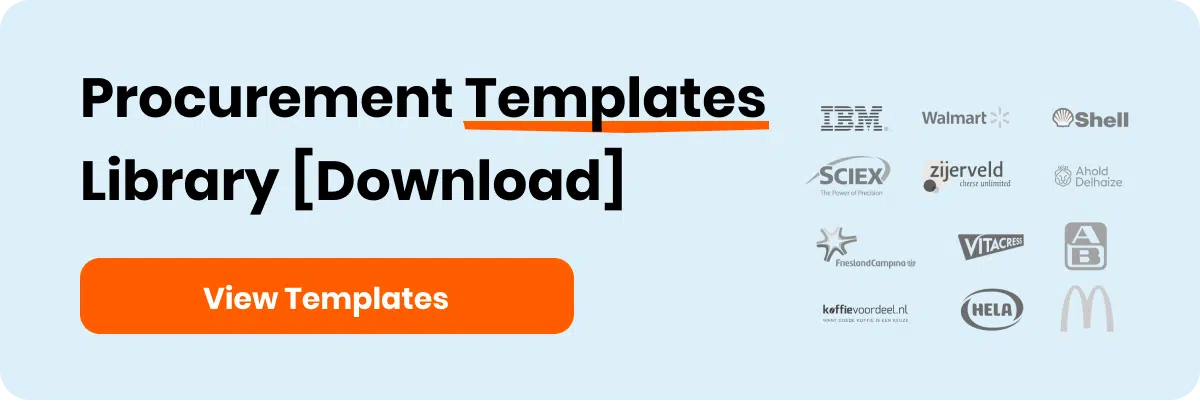ChatGPT & AI in
Procurement Course
Free Preview Lesson

Written by Marijn Overvest | Reviewed by Sjoerd Goedhart | Fact Checked by Ruud Emonds | Our editorial policy
Choosing a Contract Management Tool
Key takeaways
- Organization size, pricing, customization, integration, and contract monitoring are factors when choosing a contract management tool.
- Contract management automates tasks, improves organization, maintains compliance, and enables proactive risk management.
- Compliance with industry regulations is essential for sensitive contract data protection, fostering trust with clients and partners.
Choosing a contract management tool is crucial for your business as you need to select what suits your company the best. However, what are the factors that you need to consider when choosing one?
In this article, we are going to discuss what contract management is. Additionally, we are going to check the benefits of having a contract management tool and the factors that you need to consider in choosing one.
Once you are finished reading this article, you will have a deeper insight into what you should look for in a contract management tool. Thus, picking the tool that suits your company the best. So without further ado, let’s start!
Contract Management:What is it?
Contract management involves overseeing the entire lifecycle of a contract, from its creation to execution and evaluation, to making sure that everyone involved fulfills their obligations. It forms the foundation of a business partnership and covers various important aspects, such as managing risks, ensuring high-quality service, implementing cost-effective measures, establishing review processes, maintaining open communication, and resolving conflicts in a friendly and cooperative manner.
Here are some specific examples of contract management activities:
- Creating and negotiating contracts
- Monitoring contract performance
- Managing changes to contracts
- Resolving contract disputes
- Enforcing contract terms
- Managing contract relationships
Contract management ensures that businesses get what they pay for and that contracts are completed on time and within budget. It can also help to protect businesses from legal risks.
Managing your contracts does not necessarily mean that you need a contract management tool. However, as the complexity and volume of contracts increase, it is much more beneficial to use one than to stick to the traditional method.
Contract management tools in procurement are software programs or platforms that help with managing contracts during the procurement process. They make tasks easier by automating and streamlining contract-related activities, which saves time and reduces mistakes.
Benefitsof Contract Management Tools
Contract management tools offer several key advantages. Firstly, they save time and increase efficiency by automating tasks like contract creation, approval workflows, and notifications. This frees up contract managers to focus on more strategic work rather than getting bogged down in administrative duties.
Secondly, these tools improve organization and accessibility by providing a central location to store and manage contracts and related documents. This ensures easy access and eliminates the risk of losing important contract information. It also helps maintain version control, so the latest and most accurate details are always readily available.
Lastly, contract management tools assist with risk mitigation and compliance. They send automated alerts and reminders for critical contract milestones and obligations, enabling proactive risk management and preventing costly penalties. They also support compliance with regulations and internal policies, reducing the likelihood of non-compliance issues and their associated consequences.
Factors to Consider in Choosing Your Contract Management Tool
We know that it is hard to select which contract management tool suits your business more. However, you do not need to worry anymore as we are going to guide you on the factors you need to consider when choosing the best tool for you! Let’s start!
1. Consider the size of your organization and pricing
Considering the size of your organization and the pricing of a contract management tool are super important, and here is why. The size of your organization determines how big and complex your contract management needs are.
If you’re a big company, you might need a fancy tool with all the latest features. But if you’re a smaller business, a simpler and more affordable option might do the trick. In terms of pricing, We all want to be smart with our cash, right?
So, checking the pricing is necessary. You want a tool that fits your budget and gives you the best value for your money. Keep an eye out for any hidden fees, extra charges, or options to scale up or down as needed.
2. Check if the platform is easy to use
You want a contract management system that’s easy to use, plain, and simple. The success of the system depends on whether your team members will use it and find it convenient.
So, make sure to choose a tool that offers a positive user experience and is user-friendly. Choose a platform that is easy for your employees to navigate. That way, everyone will be happy to use it, and managing contracts will be a piece of cake!
3. Customized and integrated with other platforms
You should check if the contract management tool can be customized and integrated with other platforms because it gives you the freedom to make it work just the way you want and easily connect it with your other tools.
Customization lets you tweak the tool to fit your specific needs, like adding your own fields or templates. It’s like tailoring a suit to fit perfectly—everything is just right for you. Integration is like making all your apps talk to each other.
It saves you from the hassle of switching between different platforms and manually transferring data. It’s like having a smooth and seamless flow of information. So, by choosing a tool that can be customized and integrated, you’re making your life simpler, and more efficient, and keeping everything in sync. It’s all about making things work together smoothly and hassle-free.
4. Check its ability to monitor contracts
Keeping an eye on your contracts is important to stay in the loop and be in control. That’s why it is smart to choose a contract management tool that lets you monitor your contracts. With contract monitoring, you can easily track the progress, stay on top of important dates, and make sure everyone’s doing their part.
It helps you catch any issues early on and make informed decisions. Plus, it improves communication and collaboration among all involved. So, when picking a contract management tool, make sure it’s got that contract monitoring feature that will help you handle the contracts efficiently.
5. Check for security features
Checking for security features in a contract management tool is important. You want to keep your contract data safe and sound from any unauthorized access or breaches.
When the tool has strong security measures like encryption, firewalls, and access controls, you can rest easy knowing your sensitive information is well-protected. Not only that, but it’s also about following industry regulations.
Different industries have specific rules for data protection and privacy. By choosing a tool that meets these regulations, like GDPR or HIPAA, you stay compliant and avoid any legal or financial troubles down the line. Think about it: a secure tool boosts trust and confidence.
Your clients and partners will feel more comfortable sharing sensitive information and working on contracts with you. It shows that you take data security seriously and that’s a great way to build strong relationships.
Also, in order to accurately protect yourself and the data you work with, you should use third-party applications. These can be antiviruses or simply tools for optimizing computer performance. They will help clear the cache, detect suspicious software, and remove unnecessary programs (reviewed here)
Conclusion
Selecting the right contract management tool is vital for business efficiency. This article defines contract management, emphasizing its role in overseeing the contract lifecycle and ensuring successful business partnerships.
It explores the benefits of tools, emphasizing automation, organization, and risk mitigation. Crucial factors for consideration include the organization’s size, pricing, ease of use, customization, integration capabilities, and the tool’s ability to monitor contracts.
Additionally, the article underscores the importance of security features in protecting sensitive contract data and maintaining regulatory compliance, guiding businesses towards informed choices for enhanced operational efficiency.
Frequentlyasked questions
What is contract management?
Contract management involves overseeing the entire lifecycle of a contract, from its creation to execution and evaluation, to make sure that everyone involved fulfills their obligations.
What are contract management tools?
Contract management tools in procurement are software programs or platforms that help with managing contracts during the procurement process.
What to consider when choosing a contract management tool?
Some of the things that you need to consider when choosing a contract management tool are the pricing, ability to monitor contracts, security features, ease to use, and if it can be integrated with other platforms.
About the author
My name is Marijn Overvest, I’m the founder of Procurement Tactics. I have a deep passion for procurement, and I’ve upskilled over 200 procurement teams from all over the world. When I’m not working, I love running and cycling.


